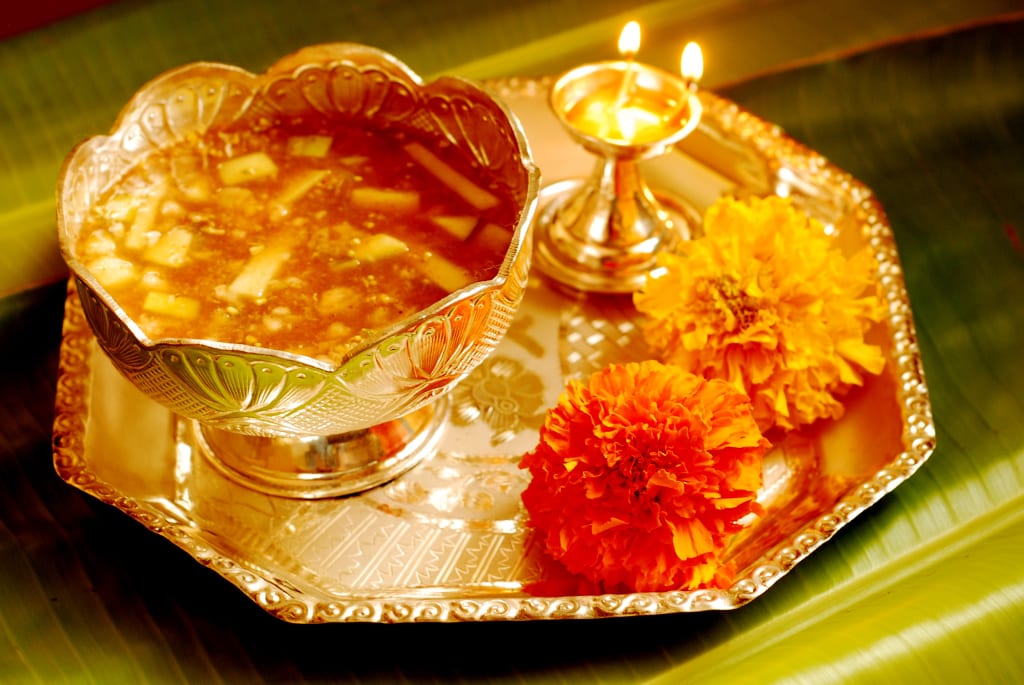Ugadi
Ugadi is a festival that is celebrated with great enthusiasm and joy in the Indian states of Andhra Pradesh, Telangana, and Karnataka. It marks the beginning of a new year according to the Hindu lunisolar calendar. People prepare traditional dishes, perform rituals and customs, and decorate their homes with flowers and rangolis.

Ugadi is a festival that is celebrated with great enthusiasm and joy in the Indian state of Andhra Pradesh, Telangana, and Karnataka. It marks the beginning of a new year, according to the Hindu lunisolar calendar. Ugadi falls on the first day of the Chaitra month, which usually falls in late March or early April.
The word "Ugadi" is derived from the Sanskrit words "yuga" and "adi," which means "era" and "beginning," respectively. The festival signifies the beginning of a new era, and it is celebrated by people with great fervor.
Preparations for the festival begin a week in advance. Houses are cleaned and decorated with mango leaves and flowers. People also draw rangolis, which are colorful patterns made on the floor with colored powders. On the day of Ugadi, people wake up early and take a bath before sunrise. They wear new clothes and visit the temple to offer prayers.
One of the most important aspects of Ugadi is the preparation of traditional dishes. People prepare a special dish called "Ugadi Pachadi," which is a mixture of six tastes - sweet, sour, salty, bitter, pungent, and astringent. It symbolizes the different experiences that life offers. The sweetness represents happiness, while the bitterness represents sadness. The sourness represents anger, and the saltiness represents fear. The pungency represents surprise, and the astringency represents disgust. People eat this dish to remind themselves that life is a mix of different experiences, and they should accept them with equanimity.
Another traditional dish prepared during Ugadi is "bobbatlu," which is a sweet bread made with jaggery and Bengal gram flour. People also prepare "pulihora," which is a rice dish flavored with tamarind and spices. These dishes are shared with family and friends, and people also distribute them to the poor and needy.
During Ugadi, people also perform various rituals and customs. They clean their houses and decorate them with mango leaves and flowers. They also apply sandalwood paste on their foreheads, wear new clothes, and visit the temple to offer prayers. Some people also perform "pujas" or religious rituals at home.
In Karnataka, people prepare a special dish called "holige," which is a sweet bread made with jaggery and lentils. They also prepare "bevu bella," which is a mixture of neem leaves and jaggery. This mixture is eaten to symbolize the mix of good and bad experiences in life.
In Telangana and Andhra Pradesh, people decorate their houses with colorful rangolis and visit the temple to offer prayers. They also prepare "bobbatlu" and "pulihora" and distribute them to family and friends. In some regions, people also perform a ritual called "Panchanga Sravanam," in which the priest reads out the predictions for the upcoming year according to the Hindu calendar.The pungency represents surprise, and the astringency represents disgust. People eat this dish to remind themselves that life is a mix of different experiences, and they should accept them with equanimity.
In conclusion, Ugadi is a festival that is celebrated with great enthusiasm and joy in the Indian states of Andhra Pradesh, Telangana, and Karnataka. It marks the beginning of a new year according to the Hindu lunisolar calendar. People prepare traditional dishes, perform rituals and customs, and decorate their homes with flowers and rangolis. People decorate their houses with colorful rangolis and visit the temple to offer prayers. They also prepare "bobbatlu" and "pulihora" and distribute them to family and friends.The festival is a reminder that life is a mix of different experiences, and people should accept them with equanimity. Ugadi is a time for family and friends to come together, share food, and celebrate the new year with great enthusiasm.
About the Creator
Enjoyed the story? Support the Creator.
Subscribe for free to receive all their stories in your feed. You could also pledge your support or give them a one-off tip, letting them know you appreciate their work.





Comments
There are no comments for this story
Be the first to respond and start the conversation.